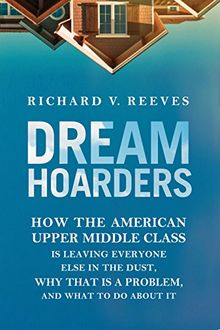
America is becoming a class-based society
America prides itself on being a classless society, where hard work and talent get you ahead. A place where status is earned, not inherited. At least, that's the idea. In fact, the United States is marked by a deepening class divide. Debates about inequality focus on the wealth of "super-rich," or the top 1 percent. But as Richard Reeves shows, the most important and consequential gap in American society is the one between the upper middle class-broadly, the top fifth-and everyone else.
The separation of the upper middle class can be seen in the income distribution, but also in family structure, neighborhoods, attitudes, and lifestyle. This is not just an economic divide but a fracturing of American society along class lines.
Reeves shows how high-income parents are now passing on their class status to their children, threatening American ideals of equal opportunity and social mobility. Upper-middle-class children become upper-middle-class adults; class separation becomes class perpetuation. "For Americans," Reeves writes, "this should set alarm bells ringing."
The upper middle class succeeds by accumulating skills and qualifications, but also by engaging in various forms of " opportunity hoarding," which make it harder for others to rise up to the top. These unfair mechanisms include zoning laws, college admissions procedures, and the allocation of internships. The result is a less competitive economy, Reeves argues, as well as a less open society.
Inequality is natural, even desirable, when it results from fair competition. Class gaps that result from unfair advantage, however, generate legitimate resentment from those who are excluded. It is not too late to close the gap, however. Reeves outlines practical steps toward restoring opportunity and weakening class distinctions. This fascinating book shows how American society has become the very class-defined society that earlier Americans rebelled against-and what can be done to restore a more equitable social order.